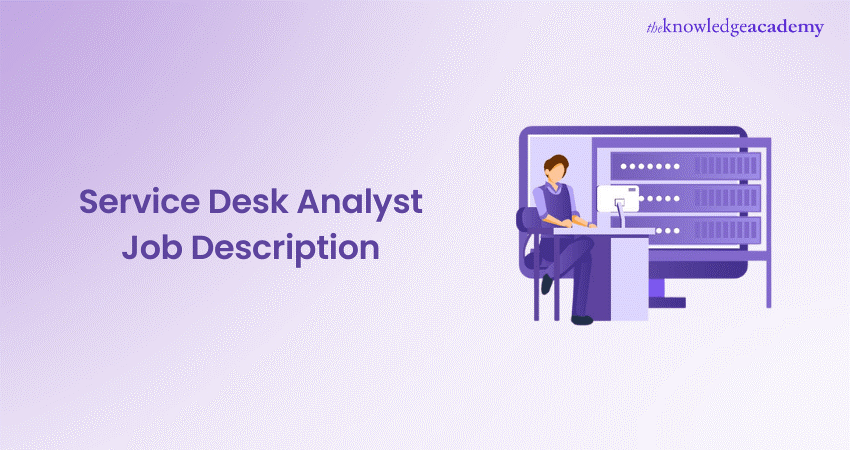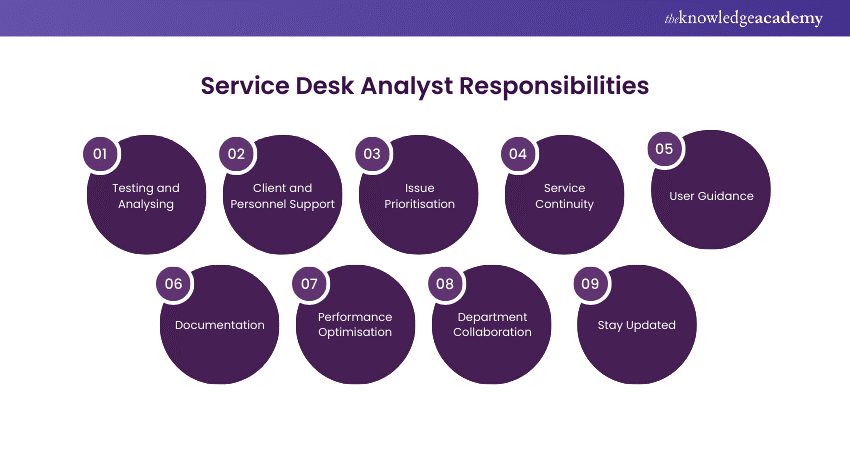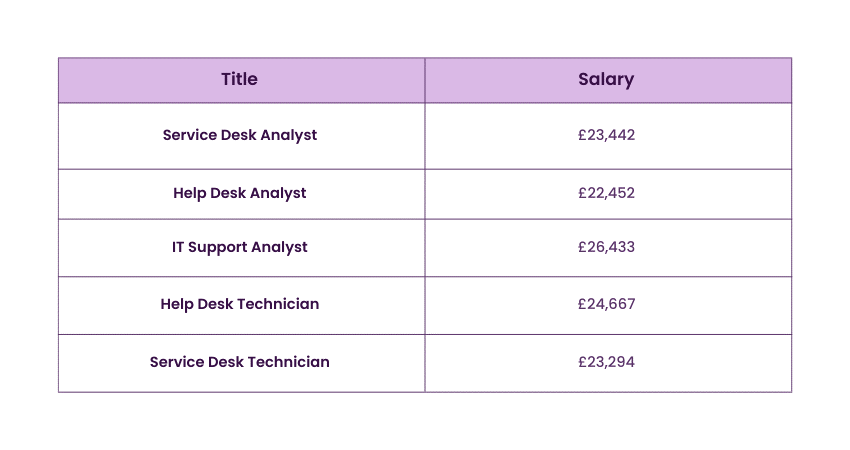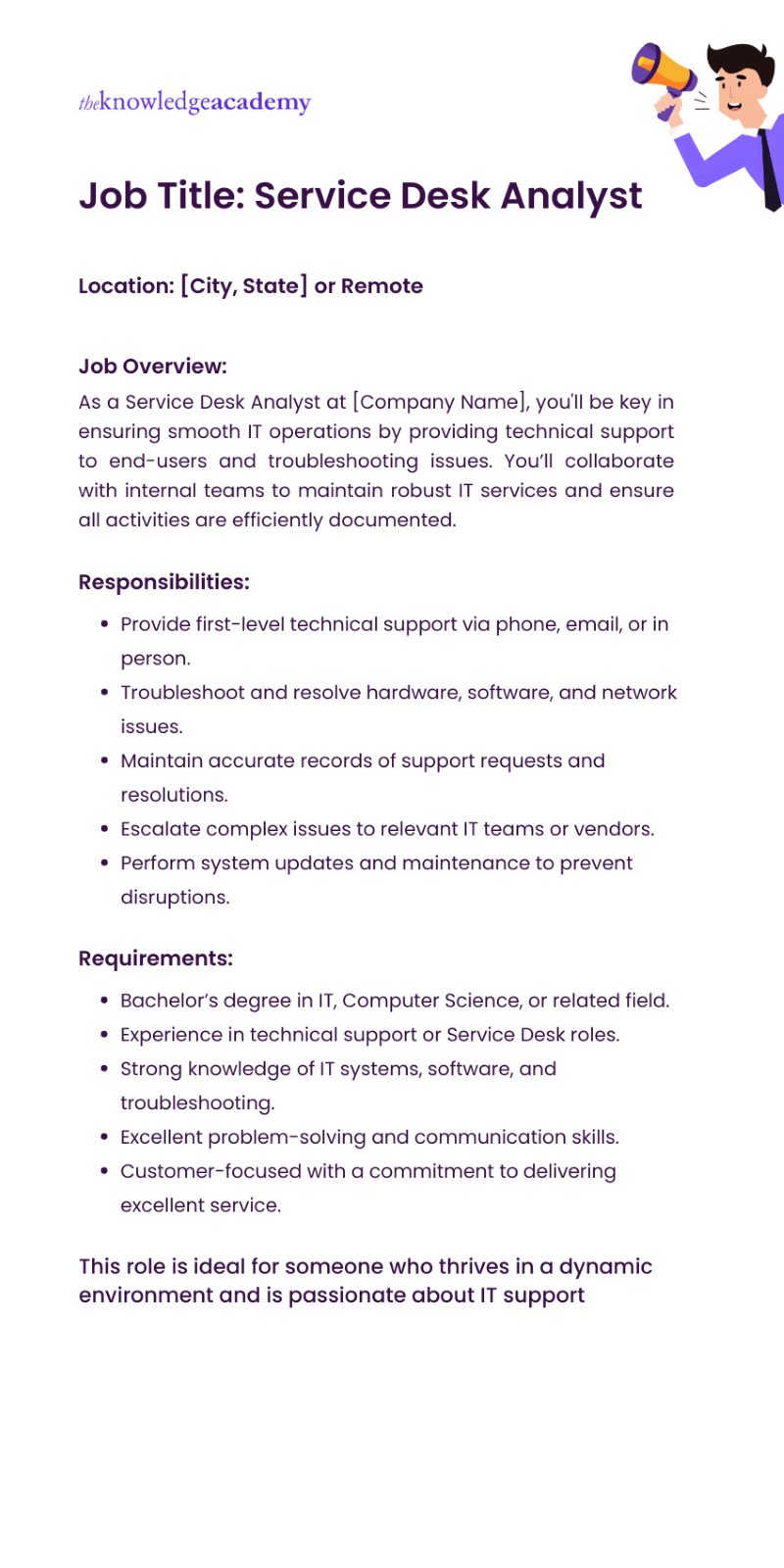We may not have the course you’re looking for. If you enquire or give us a call on +44 1344 203999 and speak to our training experts, we may still be able to help with your training requirements.
Training Outcomes Within Your Budget!
We ensure quality, budget-alignment, and timely delivery by our expert instructors.

A Service Desk Analyst is the backbone of IT support, ensuring everything runs smoothly and resolving issues quickly. This role involves troubleshooting technical problems, assisting end-users, and keeping IT services in top shape. An in-depth Service Desk Analyst Job Description provides a comprehensive view of the responsibilities, skills, and qualifications required for this critical position.
Want to know more about what a Service Desk Analyst does? You’re in the right place! Check out this blog on the Service Desk Analyst Job Description to discover everything you need to know about becoming a Service Desk Analyst.
Table of Contents
1) Who is a Service Desk Analyst?
2) Service Desk Analyst Responsibilities
3) Service Desk Analyst Requirements and Qualifications
4) Service Desk Analyst Skills
5) Service Desk Analyst Job Titles
6) Service Desk Analyst Job Description template
7) Conclusion
Who is a Service Desk Analyst?
A Service Desk Analyst, also known as a Helpdesk Analyst, provides essential technical support to users. Understanding this role helps you grasp the duties of a Service Desk Analyst and determine if this career path is right for you.
These professionals respond to customer queries, evaluate IT problems, and troubleshoot software or equipment issues daily. Depending on the organisation and the job's focus, Helpdesk Analysts may specialise in hardware, software, networks, or operating systems.
Service Desk Analyst Responsibilities
A Service Desk Analyst plays an important role in maintaining the efficiency and functionality of IT systems within an organisation. Below are the key responsibilities of this position:

1) Testing and Analysing: Evaluate IT system and software performance to identify and resolve issues
2) Client and Personnel Support: Address incoming IT queries from clients and personnel remotely via email and phone or on-site at the office.
3) Issue Prioritisation: Prioritise and resolve IT concerns, escalating serious issues to relevant stakeholders when necessary.
4) Service Continuity: Prevent service interruptions by performing system installations, updates, and maintenance procedures.
5) User Guidance: Prepare training manuals and FAQ materials for easy-access end-user support.
6) Documentation: Document processes and maintain comprehensive Service Desk records.
7) Performance Optimisation: Make recommendations to enhance IT performance and prevent future problems.
8) Department Collaboration: Work with internal departments to ensure all IT needs are met.
9) Stay Updated: Keep informed about advancements in IT to ensure the organisation remains current and competitive.
Learn how to define strategic requirements with our Certified Service Desk Manager (CSDM) Training – Join now!
Service Desk Analyst Requirements and Qualifications
To excel as a Service Desk Analyst, candidates should meet the following requirements and qualifications:
1) Educational Background: A degree in Information Technology, Computer Science, or a related field.
2) Technical Skills: Proficiency in troubleshooting hardware, software, networks, and operating systems.
3) Experience: Previous experience in a technical support or IT Service Desk role.
4) Problem-solving Abilities: Demonstrates strong analytical and problem-solving skills, adept at diagnosing and efficiently resolving IT issues.
5) Communication Skills: Possesses excellent verbal and written communication abilities, ensuring effective user assistance and thorough documentation of processes.
6) Customer Service Orientation: Committed to delivering exceptional customer service and user support, maintaining a strong focus on user satisfaction.
7) Certifications: Relevant certifications such as CompTIA A+, ITIL, or Microsoft Certified Solutions Expert (MCSE) are advantageous.
8) Adaptability: Ability to work under pressure and adapt to changing priorities and technologies.
9) Team Collaboration: Strong collaboration skills to work effectively with internal departments and stakeholders.
10) Continuous Learning: Commitment to staying updated on the current advancements in IT and continuously improving technical skills.
Service Desk Analyst Skills
Service Desk Analysts rely on their teamwork, communication, and organisational skills to succeed in their roles. Additionally, they develop a range of practical abilities, including:
1) Knowledge of the Organisation's Products or Processes
Service Desk Analysts must have in-depth knowledge of the organisation's products or services to provide accurate assistance to customers. For instance, they may handle issues related to a Software-as-a-Service (SaaS) product. Developing expert knowledge of these products and their functionalities ensures that analysts can provide customers with the correct answers and quickly resolve their problems.
2) Customer Relationship Management
Customer Relationship Management (CRM) involves practices and technologies that help an organisation build and maintain successful and long-lasting relationships with customers.
Service Desk Analysts often follow scripts to answer specific customer questions via phone or chat, ensuring they provide detailed information and share all necessary resources for handling technical issues. CRM software allows analysts to view customer history and store critical customer information.
3) Task Management Software
Service Desk Analysts use task management software to efficiently analyse and prioritise tasks or customer queries. These tools help automate workflows, such as sending automated responses to inform customers when to expect a resolution.
Features of task management apps include team calendars, timelines, and statistics, which track the success rates of the team and individual members.
4) Process Documentation
Process documentation involves creating and managing internal documents that inform employees of the correct procedures for completing tasks. Service Desk Analysts contribute to expanding their employer's IT database by developing an extensive and detailed process library. This library is used by other analysts to help customers or staff members resolve recurring technical problems.
Learn problem-solving and provide timely solutions with our Service Desk Senior Analyst Training – Register today!
Service Desk Analyst Job Titles
Service Desk Analysts can hold various titles, all essentially representing the same role with different names. The annual average salary for a Service Desk Analyst in the UK varies depending on the title. When searching for Service Desk Analyst jobs, consider these alternative titles as well:

Souce:Glassdoor
Service Desk Analyst Job Description Template
We have given a template for your reference. It will help you better understand the responsibilities and requirements of a Service Desk Analyst. Let’s dive in!

Conclusion
The Service Desk Analyst Job Description outlines a crucial role focused on providing top-notch technical support and ensuring smooth IT operations. Service Desk Analysts troubleshoot issues, maintain IT systems, and deliver excellent customer service, making them indispensable to organisational success. Understanding the key responsibilities and necessary skills for this role is essential for anyone looking to excel in the field of IT support.
Become a certified Service Desk Professional – Sign up with our SDI Training now!
Frequently Asked Questions

The fundamentals of a Service Desk include providing a single point of contact for IT support, managing incidents and service requests, ensuring user satisfaction, and maintaining communication between users and IT services. Key aspects are efficient issue resolution, system monitoring, and continuous improvement of service delivery.

Service desks typically operate at multiple levels: Level 1 handles basic troubleshooting and common issues; Level 2 addresses more complex problems requiring specialised knowledge; Level 3 involves expert support for advanced issues and escalations. Each level ensures efficient problem resolution and optimal resource utilisation.

The Knowledge Academy takes global learning to new heights, offering over 30,000 online courses across 490+ locations in 220 countries. This expansive reach ensures accessibility and convenience for learners worldwide.
Alongside our diverse Online Course Catalogue, encompassing 19 major categories, we go the extra mile by providing a plethora of free educational Online Resources like News updates, Blogs, videos, webinars, and interview questions. Tailoring learning experiences further, professionals can maximise value with customisable Course Bundles of TKA.

The Knowledge Academy’s Knowledge Pass, a prepaid voucher, adds another layer of flexibility, allowing course bookings over a 12-month period. Join us on a journey where education knows no bounds.

The Knowledge Academy offers various SDI Training, including the Certified Service Desk Manager (CSDM), Service Desk Analyst (SDA), and Service Desk Senior Analyst Training. These courses cater to different skill levels and provide comprehensive insights into the Top Service Desk Benefits for Your Business.
Our IT Service Management Blogs cover a range of topics related to SDI Training, offering valuable resources, best practices, and industry insights. Whether you are a beginner or looking to advance your IT Service Management skills, The Knowledge Academy's diverse courses and informative blogs have got you covered.
Upcoming IT Service Management Resources Batches & Dates
Date
 Service Desk Analyst (SDA)
Service Desk Analyst (SDA)
Mon 6th Jan 2025
Mon 7th Apr 2025
Mon 4th Aug 2025
Mon 1st Dec 2025







 Top Rated Course
Top Rated Course



 If you wish to make any changes to your course, please
If you wish to make any changes to your course, please


